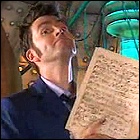
 Outgoing Doctor Who actor David Tennant interviews his equally outgoing boss, showrunner Russell T. Davies, about the new series, from the process of bringing it back to keeping it on course after it became one of the biggest blockbuster success stories of scripted British television during the 2000s. Topics discussed include Davies’ skill in handling (and occasionally flat-out lying to) the press, stunt casting, the origins of the BBC’s two spin-off series, and Davies’ recent move to America. Davies occasionally turns the tables on his interrogator and asks him questions as well, interspersed with clips from the show and a few songs that have appeared in episodes.
Outgoing Doctor Who actor David Tennant interviews his equally outgoing boss, showrunner Russell T. Davies, about the new series, from the process of bringing it back to keeping it on course after it became one of the biggest blockbuster success stories of scripted British television during the 2000s. Topics discussed include Davies’ skill in handling (and occasionally flat-out lying to) the press, stunt casting, the origins of the BBC’s two spin-off series, and Davies’ recent move to America. Davies occasionally turns the tables on his interrogator and asks him questions as well, interspersed with clips from the show and a few songs that have appeared in episodes.
LogBook entry & review by Earl Green
Review: I suppose it’d be a bit too easy to hook me with the very notion of David Tennant introducing ELO’s “Mr. Blue Sky” on the radio, putting two of my favorite things in one spot. That admission of bias and favoritism aside, Who On Who? is a lively examination of Russell T. Davies’ era as executive producer and head writer of Doctor Who in a clip-heavy interview format. If anything, I wish that some of the time spent on clips – namely the massive and somewhat disjointed montage of disassociated scenes from Davies’ era at the top of the show – could’ve been given over to more in-depth interviews. This could’ve gone on for two hours and I don’t think it would’ve outstayed its welcome.
That being said, Who On Who? is general audience fare, and wasn’t really conceived as a vehicle for obscure questions that only Doctor Who fans could love. I’ve listened to other audio memoirs from past producers of Doctor Who over the past year, and while those memoirs were meant for the faithful, Who On Who? is clearly made for the masses. But that doesn’t mean that it’ll insult the intelligence or waste the time of Doctor Who die-hards. The questions are all legitimate; if you’ve poured over and analyzed every word that Davies has said in his Doctor Who Magazine columns, his book “The Writers’ Tale”, or dissected his every statement to the press in internet forums, you likely won’t find much here that’s new.
I haven’t really done that, despite being quite the Doctor Who fan, so I found it both interesting and fascinating. It’s surprising to hear Davies admit that he applied lessons learned from watching reality TV to the new series from the moment planning started; from the flashy, color-saturated visuals to Doctor Who’s wall-to-wall music and rapid-fire editing, Davies has sought to make every episode an event on par with reality TV. In that respect, maybe his move to America is a godsend: he made a scripted drama compete, successfully, with reality TV in Britain. Speaking as someone who isn’t a fan of reality TV (indeed, the very name is a massive misnomer), I’d like to see Davies make something that cuts through the clutter of the American airwaves as well. I don’t know how long it’d last on the air, but when Davies talks about learning from American TV and teaching American TV a few things at the same time, surely it’d be worth a try.
Tennant often gets roped by Davies into helping answer the very questions he’s asking; he’s not just a passive interviewer trying to prod information out of his subject. Perhaps the most heartening thing that comes out of this Q&A session is Davies’ constant refrain that he doesn’t want to ruin the show, or the surprise of the show, for its younger audience, and his lament of the spoiler-hungry internet culture that seeks to expose every plot twist ahead of the broadcast schedule. Also interesting is Davies’ answer as to why he, as a writer, has even gotten involved in the press dialogue about any of his projects, whether the project in question is Doctor Who or Queer As Folk. His answer as to why he feels that responsibility and doesn’t just leave the much more visible cast members field some questions explains a lot about why he’s held in such high regard as a British TV writer.
With only five dozen episodes of Doctor Who under his belt in five years (not counting Torchwood and the Sarah Jane Adventures), Russell T. Davies may well have left a more indelible impression on Doctor Who than his predecessor, John Nathan-Turner, who was the series’ producer for ten years. Love it or hate it, Davies brought Doctor Who in step with the times, worthy of grabbing attention away from its television contemporaries (and how). He sewed the show’s previously seldom-visible heart onto its sleeve and made it not just science fiction, but Drama, with a capitol D. And the BBC has been rewarded with its biggest hit in years, one that has made quite a few careers in the process. While I have found things to criticize about the new show, I can forgive quite a lot of them for the simple fact that Davies did the impossible and resurrected a property that most people felt had sunk into the obscurity of its own fandom, and when it fires on all cylinders, this new late-model Doctor Who has been one of the very best things on TV for the past decade.
